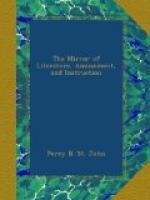Nay, in our own times, have we not seen two men of
genius, a Byron and a Burns: they both, by mandate
of Nature, struggle and must struggle towards clear
manhood, stormfully enough, for the space of six-and-thirty
years; yet only the gifted ploughman can partially
prevail therein; the gifted peer must toil, and strive,
and shoot out in wild efforts, yet die at last in
boyhood, with the promise of his manhood still but
announcing itself in the distance. Truly, as
was once written, “it is only the artichoke that
will not grow except in gardens: the acorn is
cast carelessly abroad into the wilderness, yet on
the wild soil it nourishes itself, and rises to be
an oak.” All woodmen, moreover, will tell
you that fat manure is the ruin of your oak; likewise
that the thinner and wilder your soil, the tougher,
more iron-textured is your timber,—though,
unhappily, also the smaller. So too with the
spirits of men: they become pure from their errors
by suffering for them: he who has battled, were
it only with poverty and hard toil, will be found
stronger, more expert, than he who could stay at home
from the battle, concealed among the provision-wagons,
or even not unwatchfully “abiding by the stuff.”
In which sense, an observer, not without experience
of our time, has said:—“Had I a man
of clearly developed character (clear, sincere within
its limits), of insight, courage, and real applicable
force of head and of heart, to search for; and not
a man of luxuriously distorted character, with haughtiness
for courage, and for insight and applicable force,
speculation and plausible show of force,—it
were rather among the lower than among the higher
classes that I should look for him.”
A hard saying, indeed, seems this same; that he, whose
other wants were all beforehand supplied; to whose
capabilities no problem was presented except even
this, How to cultivate them to best advantage, should
attain less real culture than he whose first grand
problem and obligation was nowise spiritual culture,
but hard labour for his daily bread! Sad enough
must the perversion be, where preparations of such
magnitude issue in abortion: and a so sumptuous
heart with all its appliances can accomplish nothing,
not so much as necessitous nature would of herself
have supplied! Nevertheless, so pregnant is life
with evil as with good; to such height in an age rich,
plethorically overgrown with means, can means be accumulated
in the wrong place, and immeasurably aggravate wrong
tendencies, instead of righting them, this sad and
strange result may actually turn out to have been
realized.—Edinburgh Rev. (just published.)
* * * *
*
SIR EGERTON BRYDGES.—THE LATE DUKE OF NORFOLK.
(From Clavering’s Autobiography.)




